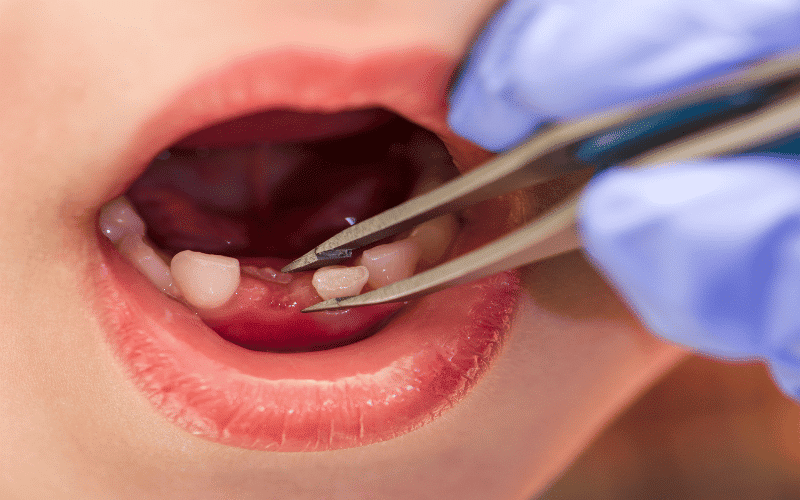Navigating the Oops Moment: What to Do After Accidentally Rinsing After a Tooth Extraction
A tooth extraction, while necessary, can be a nerve-wracking experience. Following the procedure, proper aftercare is crucial for optimal healing and minimizing discomfort. This article addresses a common concern – accidentally rinsing your mouth after a tooth extraction. It explores the potential risks, outlines steps to take if it happens, and offers guidance on ensuring a smooth recovery despite the misstep.
Understanding the Importance of the Blood Clot: Healing’s Foundation
Following a tooth extraction, a blood clot forms at the socket (opening) where the tooth was removed. This clot plays a vital role in the healing process by:
- Stopping Bleeding: The clot acts as a plug, preventing bleeding from the extraction site.
- Promoting Healing: The clot acts as a scaffold for new tissue growth, facilitating healing of the socket.
The Risk of Rinsing: Dislodging the Clot and Potential Complications
Rinsing your mouth too vigorously, especially during the first 24-48 hours after a tooth extraction, can dislodge the blood clot. This dislodgement, known as dry socket, can lead to a number of unpleasant complications, including:
- Throbbing Pain: Dry socket is characterized by intense throbbing pain at the extraction site.
- Exposed Bone: Without the clot covering the socket, the underlying bone might become exposed, causing further discomfort.
- Bad Breath: The exposed bone and socket can harbor bacteria, leading to unpleasant breath odor.
- Delayed Healing: Dislodgement of the clot can significantly delay the healing process.
The Accidental Rinse: What to Do If It Happens
If you accidentally rinse your mouth after a tooth extraction, don’t panic. Here’s what to do:
- Stop Rinsing Immediately: Avoid further rinsing or vigorous oral hygiene practices that could further dislodge the clot.
- Gently Rinse with Salt Water: Make a lukewarm saltwater solution (half teaspoon of table salt dissolved in a glass of warm water) and gently swish for a few seconds without spitting forcefully. This can help soothe any irritation.
- Apply Gentle Pressure: If there’s any bleeding, apply gentle pressure with a clean gauze pad to the extraction site for 10-15 minutes.
- Monitor Symptoms: Pay close attention to any pain, swelling, or signs of dry socket mentioned above.
- Contact Your Dentist: Inform your dentist as soon as possible about the accidental rinse. They can assess the situation and determine if further intervention is needed.
Ensuring a Smooth Recovery: Tips Beyond the Oops
Here are some additional tips to promote optimal healing after a tooth extraction:
- Maintain a Soft-Food Diet: Stick to soft foods that require minimal chewing for the first few days to minimize pressure on the extraction site.
- Gentle Oral Hygiene: Brushing and flossing are crucial to prevent infection, but be very gentle around the extraction site. Use a soft-bristled toothbrush and avoid harsh rinsing.
- Pain Management: Over-the-counter pain medication can help manage discomfort after surgery. Follow your dentist’s instructions regarding dosage and frequency.
- Rest and Avoid Strenuous Activity: Allow your body ample time to heal. Avoid strenuous activity or exercise that could increase bleeding or discomfort.
- Avoid Smoking and Alcohol: Smoking and alcohol consumption can impede healing and increase the risk of infection.
Frequently Asked Questions (FAQ) About Accidental Rinsing After Tooth Extraction
Q: How long after a tooth extraction is it safe to rinse my mouth?
A: Generally, avoid vigorous rinsing for at least 48 hours after a tooth extraction. It’s best to consult your dentist for specific guidance on when to resume normal rinsing practices.
Q: What are the signs of dry socket?
A: Throbbing pain at the extraction site, exposed bone, bad breath, and a delayed healing process are all potential signs of dry socket.
Q: Will I definitely get dry socket if I accidentally rinsed my mouth?
A: Not everyone who accidentally rinses experiences dry socket. However, it increases the risk. Early intervention is key, so be sure to monitor symptoms and contact your dentist if you have any concerns.
Q: What will my dentist do if I have dry socket?
A: Your dentist might use a medicated dressing to help promote clot formation and manage pain. In some cases, additional medication or irrigation might be necessary.
By understanding the importance of the blood clot, taking steps to minimize the risk of dislodging it, and following proper aftercare practices, you can ensure a smooth recovery despite an accidental rinse after tooth extraction.

